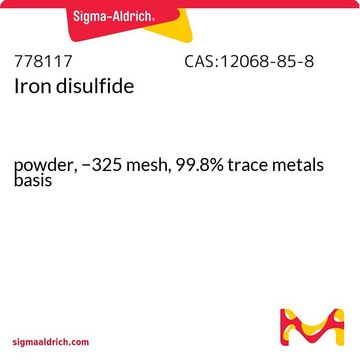343161
Iron(II) sulfide
−100 mesh, 99.9% trace metals basis
Synonym(s):
Ferrous sulfide
Sign Into View Organizational & Contract Pricing
All Photos(2)
About This Item
Empirical Formula (Hill Notation):
FeS
CAS Number:
Molecular Weight:
87.91
EC Number:
MDL number:
UNSPSC Code:
12352302
eCl@ss:
38190405
PubChem Substance ID:
NACRES:
NA.55
Assay:
99.9% trace metals basis
form:
powder
Recommended Products
Quality Level
Assay
99.9% trace metals basis
form
powder
reaction suitability
reagent type: catalyst
core: iron
particle size
−100 mesh
density
4.84 g/mL at 25 °C (lit.)
SMILES string
S=[Fe]
InChI
1S/Fe.S
InChI key
MBMLMWLHJBBADN-UHFFFAOYSA-N
Looking for similar products? Visit Product Comparison Guide
Application
- Progress in bioleaching: fundamentals and mechanisms of microbial metal sulfide oxidation - part A: This study delves into the microbial oxidation of metal sulfides like Iron(II) sulfide, shedding light on bioleaching processes crucial for the extraction of valuable metals from ores, which is highly relevant for environmental and materials science applications (Vera et al., 2022).
- Novel QTL Associated with Aerenchyma-Mediated Radial Oxygen Loss (ROL) in Rice: Explores genetic traits influenced by conditions such as the presence of Iron(II) sulfide in paddy fields, providing insights into how rice adapts to iron-rich anaerobic soils, which is vital for agricultural biotechnology and crop science (Duyen et al., 2022).
- Fe(ii) and Fe(iii) dithiocarbamate complexes as single source precursors: Investigates the synthesis of nanoscale iron sulfides from these precursors, using in situ X-ray absorption spectroscopy, which is essential for developing advanced materials with specific magnetic and electronic properties (Roffey et al., 2019).
Storage Class Code
11 - Combustible Solids
WGK
WGK 3
Flash Point(F)
Not applicable
Flash Point(C)
Not applicable
Choose from one of the most recent versions:
Already Own This Product?
Find documentation for the products that you have recently purchased in the Document Library.
Customers Also Viewed
The structural plasticity of the proximal [4Fe3S] cluster is responsible for the O2 tolerance of membrane-bound [NiFe] hydrogenases.
Jean-Marie Mouesca et al.
Angewandte Chemie (International ed. in English), 52(7), 2002-2006 (2013-01-09)
David P Summers et al.
Astrobiology, 12(2), 107-114 (2012-01-31)
Understanding the abiotic fixation of nitrogen and how such fixation can be a supply of prebiotic nitrogen is critical for understanding both the planetary evolution of, and the potential origin of life on, terrestrial planets. As nitrogen is a biochemically
Mei Wang et al.
Dalton transactions (Cambridge, England : 2003), 40(48), 12793-12800 (2011-10-11)
The research on structural and functional biomimics of the active site of [FeFe]-hydrogenases is in an attempt to elucidate the mechanisms of H(2)-evolution and uptake at the [FeFe]-hydrogenase active site, and to learn from Nature how to create highly efficient
Vanessa N L Wong et al.
Water research, 47(2), 821-832 (2012-12-04)
Benthic sediments in coastal acid sulfate soil (CASS) drains can contain high concentrations (~1-5%) of acid volatile sulfide (AVS) as nano-particulate mackinawite. These sediments can sequester substantial quantities of trace metals. Because of their low elevation and the connectivity of
Thanh Binh Nguyen et al.
Journal of the American Chemical Society, 135(1), 118-121 (2012-12-20)
Iron sulfide generated in situ from elemental sulfur and iron was found to be highly efficient in catalyzing a redox/condensation cascade reaction between 2-amino/hydroxy nitrobenzenes and activated methyl groups. This method represents a straightforward and highly atom economical approach to
Our team of scientists has experience in all areas of research including Life Science, Material Science, Chemical Synthesis, Chromatography, Analytical and many others.
Contact Technical Service









